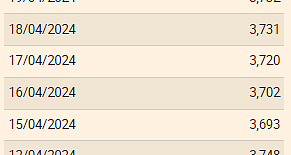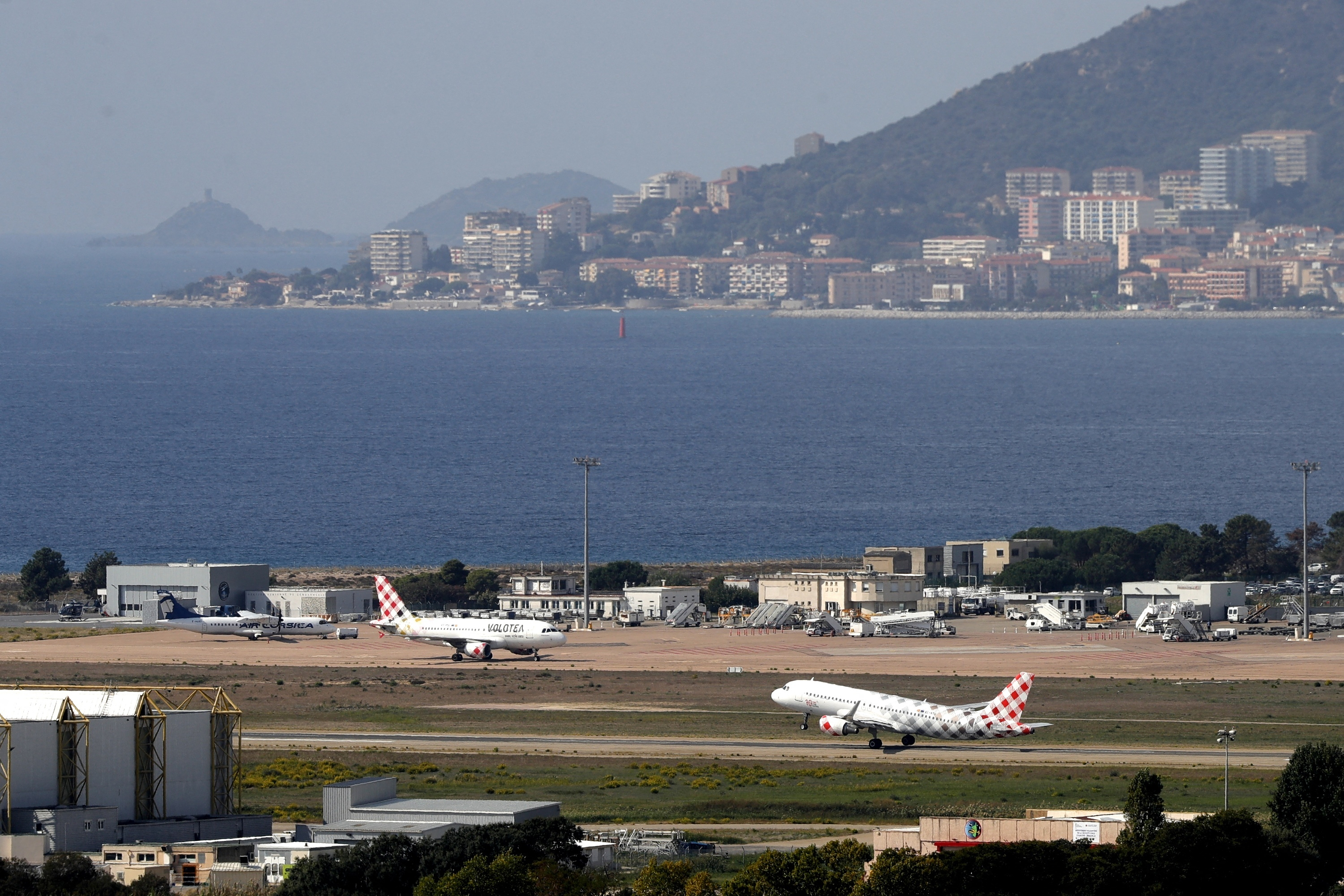During a visit to Seoul, Federal President Frank-Walter Steinmeier sharply condemned North Korea's latest missile tests and demanded that they be stopped. An unprecedented series of tests has been observed since the beginning of the year, and the rocket salvos of the past few days have made the situation considerably worse, said Steinmeier on Friday after talks with South Korean President Yoon Suk Yeol. "I say with all clarity: This escalation is unacceptable and the regime in Pyongyang alone is responsible for it."
"These tests violate UN Security Council resolutions and endanger international security." Germany has great respect for South Korea's tireless efforts to restart the negotiation process with the aim of denuclearizing North Korea. "Germany is ready to provide support," Steinmeier assured.
North Korea has tested numerous missiles in recent days. On the night of Friday, the North Korean military also fired artillery barrages at the so-called "maritime buffer zone" in the sea area between North and South Korea. According to the South Korean military, around 80 artillery shells landed in the buffer zone. South Korea's chiefs of staff said the shelling was a "clear violation" of the agreement that established the buffer zone.
North Korea is conducting its missile and artillery tests, while South Korea is observing state days of mourning after last weekend's stampede that killed more than 150 in the capital Seoul. Pyongyang's "provocations" violated the "commandments of humanity," said a spokeswoman for South Korea's unification ministry.
The Seoul government condemned the "continuing threats" based on North Korea's "reckless development of nuclear weapons and missiles". North Korea had already fueled tensions in the region by firing rockets again in the past few days. According to South Korean information, Pyongyang shot down an ICBM on Thursday, but the test, according to the South Korean military, "probably failed", as the South Korean military announced.
In response to the latest missile tests, the USA called on the international community to fully implement the sanctions against Pyongyang and extended the joint military maneuvers with South Korea under the name "Vigilant Storm" until Saturday.
North Korea had already fired 23 missiles on Wednesday. According to the South Korean army, one of the missiles crossed the de facto maritime border between North and South Korea. According to the General Staff, it came "closest than any missile since the end of the Korean War in 1953" to South Korean territorial waters, hitting the sea just 57 kilometers east of mainland South Korea.
Washington and Seoul have been warning for months that North Korea could conduct a nuclear weapons test in the near future. It would be the first such test since 2017. North Korea has carried out six nuclear weapons tests since 2006.

 The Euribor today remains at 3.734%
The Euribor today remains at 3.734% Germany: the trial of an AfD leader, accused of chanting a Nazi slogan, resumes this Tuesday
Germany: the trial of an AfD leader, accused of chanting a Nazi slogan, resumes this Tuesday New York: at Columbia University, the anti-Semitic drift of pro-Palestinian demonstrations
New York: at Columbia University, the anti-Semitic drift of pro-Palestinian demonstrations What is Akila, the mission in which the Charles de Gaulle is participating under NATO command?
What is Akila, the mission in which the Charles de Gaulle is participating under NATO command? What High Blood Pressure Does to Your Body (And Why It Should Be Treated)
What High Blood Pressure Does to Your Body (And Why It Should Be Treated) Vaccination in France has progressed in 2023, rejoices Public Health France
Vaccination in France has progressed in 2023, rejoices Public Health France Food additives suspected of promoting cardiovascular diseases
Food additives suspected of promoting cardiovascular diseases “Even morphine doesn’t work”: Léane, 17, victim of the adverse effects of an antibiotic
“Even morphine doesn’t work”: Léane, 17, victim of the adverse effects of an antibiotic Collection of booklet A stalls in March
Collection of booklet A stalls in March Kering expects a 40 to 45% drop in operating profit in the first half
Kering expects a 40 to 45% drop in operating profit in the first half Smartphones, televisions, household appliances… MEPs adopt a “right to repair”
Smartphones, televisions, household appliances… MEPs adopt a “right to repair” Fintechs increasingly focused on business services
Fintechs increasingly focused on business services The standoff between the organizers of Vieilles Charrues and the elected officials of Carhaix threatens the festival
The standoff between the organizers of Vieilles Charrues and the elected officials of Carhaix threatens the festival Strasbourg inaugurates a year of celebrations and debates as World Book Capital
Strasbourg inaugurates a year of celebrations and debates as World Book Capital Kendji Girac is “out of the woods” after his gunshot wound to the chest
Kendji Girac is “out of the woods” after his gunshot wound to the chest The Court of Auditors scrutinizes the management and projects of the Center Pompidou
The Court of Auditors scrutinizes the management and projects of the Center Pompidou Skoda Kodiaq 2024: a 'beast' plug-in hybrid SUV
Skoda Kodiaq 2024: a 'beast' plug-in hybrid SUV Tesla launches a new Model Y with 600 km of autonomy at a "more accessible price"
Tesla launches a new Model Y with 600 km of autonomy at a "more accessible price" The 10 best-selling cars in March 2024 in Spain: sales fall due to Easter
The 10 best-selling cars in March 2024 in Spain: sales fall due to Easter A private jet company buys more than 100 flying cars
A private jet company buys more than 100 flying cars This is how housing prices have changed in Spain in the last decade
This is how housing prices have changed in Spain in the last decade The home mortgage firm drops 10% in January and interest soars to 3.46%
The home mortgage firm drops 10% in January and interest soars to 3.46% The jewel of the Rocío de Nagüeles urbanization: a dream villa in Marbella
The jewel of the Rocío de Nagüeles urbanization: a dream villa in Marbella Rental prices grow by 7.3% in February: where does it go up and where does it go down?
Rental prices grow by 7.3% in February: where does it go up and where does it go down? Europeans: “All those who claim that we don’t need Europe are liars”, criticizes Bayrou
Europeans: “All those who claim that we don’t need Europe are liars”, criticizes Bayrou With the promise of a “real burst of authority”, Gabriel Attal provokes the ire of the opposition
With the promise of a “real burst of authority”, Gabriel Attal provokes the ire of the opposition Europeans: the schedule of debates to follow between now and June 9
Europeans: the schedule of debates to follow between now and June 9 Europeans: “In France, there is a left and there is a right,” assures Bellamy
Europeans: “In France, there is a left and there is a right,” assures Bellamy These French cities that will boycott the World Cup in Qatar
These French cities that will boycott the World Cup in Qatar Basketball: Maccabi Tel Aviv and Real lead in the Euroleague quarter-finals
Basketball: Maccabi Tel Aviv and Real lead in the Euroleague quarter-finals Arsenal-Chelsea: Odegaard's magical passes, the sinking of Chelsea...The tops and the flops
Arsenal-Chelsea: Odegaard's magical passes, the sinking of Chelsea...The tops and the flops Serie A: Bologna surprises AS Rome in the race for the C1
Serie A: Bologna surprises AS Rome in the race for the C1 Serie A: Marcus Thuram king of Italy, end of the debate for the position of number 9 with the Blues?
Serie A: Marcus Thuram king of Italy, end of the debate for the position of number 9 with the Blues?


















